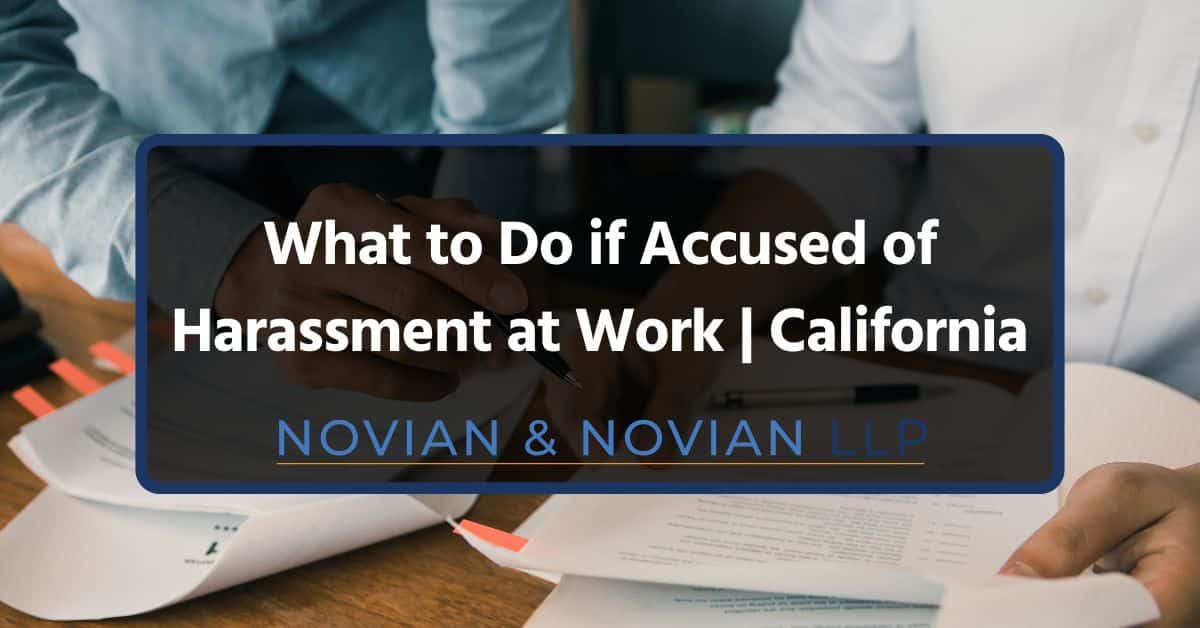
By Farid Novian | Apr 10, 2025 | Employment Law
Being accused of workplace harassment is a serious matter that requires immediate and thoughtful action, especially in California, where labor laws are stringent. Employers must understand both California laws and their own internal policies to navigate such accusations responsibly and legally.
As an employer, if you are accused of harassment at work, you must stay professional and neutral at all times. Then, conduct an immediate and impartial investigation and ensure you document everything.
Navigating harassment accusations can be complex and overwhelming, but our expert employment lawyers at Novian & Novian can guide you through the process. With over 35 years of experience in California, you can trust us to protect you and your organization. Schedule a free consultation with us today.
This post will give an overview of California harassment laws and employer obligations. It will also cover best practices for responding to workplace harassment accusations.
What Qualifies as Harassment at Work in California?
Harassment in the workplace is a serious issue that can have devastating consequences for both employees and employers. Under California’s Fair Employment and Housing Act (FEHA), harassment is defined as unwelcome conduct that is based on a protected characteristic, such as race, gender, disability, national origin, sexual orientation, or age. The FEHA makes it unlawful for employers, supervisors, and co-workers to engage in conduct that creates a hostile work environment or results in adverse employment decisions.
Sexual Harassment is one of the most common forms of workplace harassment. It can take the form of quid pro quo harassment, where an employee is forced to submit to unwelcome sexual advances in exchange for employment benefits. Another form is hostile work environment harassment, where pervasive or severe offensive conduct, including unwelcome sexual advances or inappropriate behavior of a sexual nature, creates an uncomfortable and intimidating workplace. Offensive jokes, physical conduct of a sexual nature, or unwelcome conduct based on gender identity are examples of behaviors that can lead to a hostile work environment.
Another category is discriminatory harassment, which occurs when employees face unwelcome conduct based on characteristics protected under both California law and federal regulations, including the Civil Rights Act and the Americans with Disabilities Act (ADA). This can include harassment based on race, disability, national origin, gender, age, and other protected classes. For example, harassing behavior related to an employee’s race or ethnicity, inappropriate comments about a disability, or any behavior that violates Title VII of the Civil Rights Act is considered discriminatory harassment.
Retaliation and bullying also fall under the umbrella of workplace harassment. Retaliation occurs when an employer takes adverse actions against an employee who has filed a harassment complaint or participated in an investigation. Bullying, while not always directly tied to a protected characteristic, can still violate workplace harassment policies if it creates a hostile work environment or is perceived as harassing behavior. Social media posts, offensive conduct, or inappropriate comments from co-workers or supervisors that negatively affect an employee’s well-being may also be considered harassment.
Facing an accusation of harassment can result in significant legal and professional consequences. For example, the accused may face disciplinary measures up to and including termination of employment. Employers may also be held liable for failing to take appropriate corrective action. If the employer does not take remedial measures or fails to conduct a thorough investigation of the alleged harassment, the company may be subject to lawsuits, damaging its reputation and finances. In cases where insufficient evidence exists, employers must still take appropriate steps to address the issue while maintaining a fair and unbiased process.
What to Do if Someone Falsely Accuses You of Harassment at Work?
Facing a false accusation of harassment at work can be overwhelming and potentially damaging to your professional reputation and personal well-being. Whether the allegation involves workplace sexual harassment, discriminatory harassment, or another form of inappropriate behavior, it is essential to act methodically and thoughtfully.
In California, where strict regulations protect employees under the Fair Employment and Housing Act (FEHA), taking the right steps immediately is crucial. Therefore, knowing how to mount a legal defense is important to protecting yourself and your organization.
Do Not Panic – Act Methodically
The most important thing to remember when falsely accused of workplace harassment is to remain calm. While it is natural to feel defensive or even angry, acting impulsively can complicate the situation.
Immediate action is necessary because ignoring the accusation can result in significant legal and financial consequences, including disciplinary measures and damage to your reputation. Failure to respond appropriately may also expose your organization to liability under California’s Fair Employment and Housing Act (FEHA) or the Civil Rights Act.
Instead of jumping to conclusions or making confrontational remarks, maintain neutrality and fairness throughout the process. This approach helps protect your credibility and ensures that your response aligns with the principles of good faith and due diligence. As an employer or supervisor, it is your duty to protect employees from harassment while also upholding the rights of the accused.
Consult With an Employment Lawyer
When faced with allegations of workplace harassment, consulting with an experienced employment lawyer is always best. An employment attorney can help you navigate the complex legal landscape, including state and federal regulations such as Title VII of the Civil Rights Act and the Americans with Disabilities Act (ADA). Legal guidance is essential to ensure compliance with California law and to protect both your professional interests and your organization.
An employment lawyer will thoroughly review the allegations to determine whether they meet the legal thresholds for workplace harassment. For example, they will assess whether the conduct described constitutes unwelcome sexual advances, inappropriate behavior, or offensive conduct of a sexual nature. Additionally, they will help you understand the potential risks to your business, including the consequences of not taking appropriate corrective action or failing to conduct a thorough investigation.
Your attorney will also guide the internal investigation to ensure compliance with both California’s employment and housing regulations. They will help identify remedial measures and corrective opportunities to address the situation properly. Their expertise is invaluable in conducting a legally compliant investigation while avoiding legal pitfalls that could lead to further harassment complaints or accusations of retaliation.
Notify Your HR Department & Legal Counsel
When a harassment complaint is made, it is essential to notify your HR department and involve legal counsel immediately. HR plays a critical role in managing the situation professionally and impartially, working in collaboration with your legal team to ensure a fair and unbiased process. The HR department must document every step of the investigation, including interviews with both the accuser and the alleged harasser, witness statements, and any relevant text messages, social media posts, or other evidence.
Working closely with legal counsel helps HR navigate the complexities of workplace harassment laws and avoid actions that could be seen as retaliation or bias. This collaboration ensures that all relevant circumstances and behaviors are considered, from inappropriate jokes to more severe allegations of physical conduct or harassing behavior. Maintaining fairness and thorough documentation is essential to prevent accusations of unfair treatment or discrimination based on gender identity, age, disability, or national origin.
One of the most common mistakes employers make when handling a false accusation of harassment is retaliating against the accuser. Retaliation can include confronting the accuser directly, discussing the matter with colleagues, or taking disciplinary action without sufficient evidence. Retaliation not only violates employment laws but also exposes your organization to further legal liabilities under California’s Fair Employment and Housing Act (FEHA) and Title VII of the Civil Rights Act.
Conduct a Legally Compliant Harassment Investigation
California law mandates that harassment investigations must be conducted promptly and thoroughly. The best practice is to hire a neutral, third-party investigator to avoid conflicts of interest and ensure objectivity. If internal HR handles the investigation, they must adhere strictly to established policies and maintain impartiality throughout the process.
The investigation should include interviewing both the accuser and the accused, gathering statements from other witnesses, and collecting relevant documentation, such as social media posts, text messages, and other communication records.
Interviews should be conducted with sensitivity and respect, allowing both parties to share their perspectives without bias. Ensure that all individuals involved are treated fairly and that the investigation is documented comprehensively. Keeping accurate records of interviews, evidence, and findings is crucial for demonstrating that the investigation was handled professionally and impartially.
Legal Consequences of Mishandling Harassment Allegations
One of the most serious consequences of mishandling a harassment complaint is facing a lawsuit. If an employer fails to conduct a thorough, impartial investigation or takes inappropriate disciplinary measures without sufficient evidence, the employee may sue for wrongful termination or discrimination. A flawed investigation, bias during the process, or inadequate documentation can all contribute to a legal claim.
For instance, an employee accused of sexual harassment might file a sexual harassment lawsuit if they believe the company did not follow proper investigative protocols or unfairly terminated them without conclusive proof. Such lawsuits can result in significant financial settlements, damage to the company’s reputation, and disruption to daily operations. To protect your business, it is essential to work with an experienced employment lawyer who can defend your company in court and demonstrate that proper steps were taken during the investigation.
Beyond civil lawsuits, employers who fail to properly investigate harassment complaints may face government penalties and fines. The California Civil Rights Department (CRD) enforces workplace discrimination and harassment laws and can impose fines and other sanctions for non-compliance. This may include penalties for not conducting a legally compliant investigation, failing to implement corrective actions, or not having a proper harassment policy in place.
Additionally, employers may be liable for back-pay claims and damages if an employee successfully proves that wrongful termination or discrimination occurred. Mishandling allegations also put your company at risk of reputational harm, which can impact your ability to attract talent and maintain business relationships. Ensuring that your workplace policies comply with California law and that your investigations are thorough and unbiased is critical in mitigating these risks.
How to Defend Yourself Against False Accusations of Harassment?
To successfully defend yourself against false accusations of harassment, it is important to document everything. Maintain detailed records of all interactions related to the harassment accusation. This includes emails, text messages, social media posts, and any notes from conversations with the accuser or witnesses. Keeping comprehensive documentation helps establish a factual basis that can be crucial in demonstrating your side of the story.
If possible, identify colleagues or individuals who were present during the alleged incidents and can testify on your behalf. Gathering witness statements can help corroborate your version of events and challenge false claims.
If the allegations are proven false and you can demonstrate malicious intent or reckless disregard for the truth, consider filing a defamation claim to protect your reputation. In cases where false accusations cause harm to your professional standing or result in wrongful termination, pursuing legal action can help restore your name and recover damages.
How to Protect Yourself From Future Harassment Claims
In protecting yourself from future harassment claims, it is important to maintain professional boundaries with colleagues. Adhering to respectful communication and avoiding situations that could be perceived as inappropriate helps reduce the risk of harassment allegations.
Regularly participating in workplace training on harassment prevention and awareness is also important. Understanding company policies and California’s harassment laws helps ensure that employees know what constitutes inappropriate behavior and how to report their concerns.
You should also keep written records of workplace interactions, especially in cases of conflict or disputes. This helps create a reliable record of events. These records can be invaluable if allegations arise later.
Furthermore, when dealing with complex situations or workplace conflicts, consult your Human Resources department to ensure that your actions align with company policy and legal requirements. HR professionals can provide guidance on how to address potential issues before they escalate.
Need a Lawyer to Defend Against Workplace Harassment Claims?
Facing harassment accusations at work can be overwhelming, but it’s important to handle the situation professionally and legally. Taking the right steps not only protects your reputation but also safeguards your career and well-being. Remember to document every interaction, avoid retaliation, and seek legal guidance from experienced professionals who understand California’s complex employment laws.
Creating and maintaining a respectful workplace environment is essential to preventing future issues. Educating yourself on harassment policies, maintaining professional boundaries, and consulting HR when in doubt can help minimize risks and foster a positive work culture.
If you need legal assistance to defend against harassment claims or guidance on how to handle an accusation, come to us at Novian & Novian. Our employment attorneys here in California are ready to protect your rights and ensure a fair and thorough process. Schedule a free consultation today!
Contact Us
Have questions about this post? Novian & Novian is a full service law firm in Los Angeles with clients that span the country. Contact us today for a free consultation.
Contact Us
Have questions about this post? Novian & Novian is a full service law firm in Los Angeles with clients that span the country. Contact us today for a free consultation.





